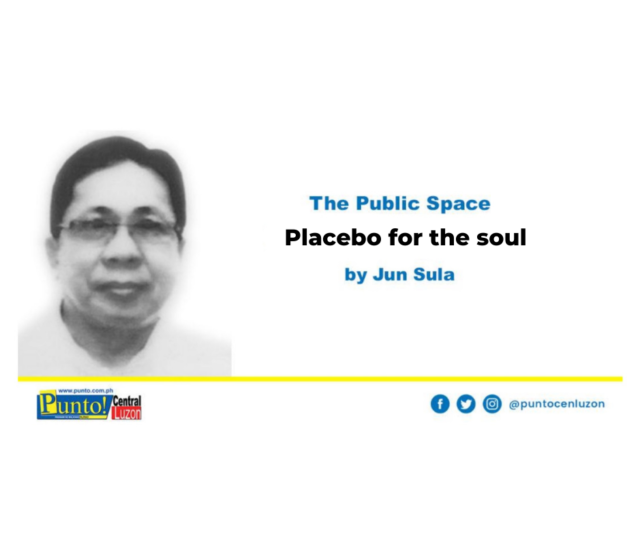Christmas lanterns of various shapes, sizes and forms have increasingly festooned the local scene even as the pandemic virus continuously lurks and stalks, at times virtually at will.
Is Santa coming to town, checking it twice who’s naughty or nice? Possibly, but seemingly unlikely.
Despite Harry The Pollyanna’s assurance that the worst is over for us, there are other voices, wrenchingly dissonant with cautionary tales. For one, the survey says 6 out of 10 Filipinos feel the worst is yet to come. For another, President Duterte has extended the country’s state of calamity for another year.
For some, interpreting conflicting messages from Harry and Company can be as excruciating as reading a Rorschach inkblot.
Thankfully, there is the longest holiday season in the Philippines. Thankfully as well, there are politicians who don’t miss the beat to use the season as props to make the people feel better, apart from their buttered but broken promises.
So the confluence of cultural tradition and political nicety have given way to those emblems of happy days, glad tidings, hope and faith that, in times like this, have evolved into something like inverted superstition.
At dusk now, the soft, colorful lights from the lanterns bounce off dark and lonely streets and reveal once busy landmarks that have been eerily mothballed by the massive fear and adversity of the pandemic.
It’s good for the soul in a fleeting moment until the latest news breaks the latest figures of the ever increasing COVID 19 cases, and the uncertainty of the end of it or the coming of a vaccine, whichever comes first. Or some government official has been caught with his hand in the cookie jar.
If there’s a placebo for the soul, let these tricky lights be.
Fortunately, there’s more than flickering hope beyond those lights, at least in Pampanga. We perceive first with or through our eyes, Emerson once said, and then through the horizon that forms beyond them. We yearn, we need for something as tangible but more positive than giving us good feeling on the horizon.
The latest is that former President Gloria Macapagal Arroyo has crafted a recovery plan for the province with no less than Vice Governor Lilia G. Pineda as the implementor. As it is, the province has not only the will but the means to make this plan happen.
It’s about time provinces, like Pampanga, come up with their own initiatives to improve the options, opportunities and odds for the people without waiting for the national government to have one for everyone. Government, whether it’s national or local, is still the people’s best bet wen adversities like the pandemic circumscribe people lives in more ways than one.
I was talking to someone in the know and I learned as many as from 11,000 to 12,000 individuals in the province are jobless. The stats in mind is around 30 percent (optimistic) to 50 per cent (pessimistic) of the province’s labor force is out of work.
The province, per the report, will tap the expertise and data of the Pampanga Chamber of Commerce and Industry (PAMCHAM) to help in launching the program. Well and good, PAMCHAM has its finger on the pulse of the business community and, more or less, has a working idea of just how many have been retrenched by its member firms.
Pampanga has the werewithal to get things moving in this direction. When a survey on what province will be among those which will succeed under a federal form of government, Pampanga made it to the list. Three advantages: huge resources, financial and manpower, and the business ecology, namely the Clark Freeport.
This is a good time to make full and vitally important use of the quarry revenues which could probably be in the billions of pesos sleeping in the banks.
A local businessman has suggested one way to help throttle business and rescue the unemployed through the plan. And that is, the province would buy essential commodities from local producers to stimulate local business and give them for free to the unemployed sector. Virtually, a relief and rescue operation of great scale.
The core problem that still remains, according to the businessman, is that products get stuck on the shelves because there are no buyers. There are no buyers because people have lost their incomes or are fearful of catching the deadly virus.
Dr. Rey Aquino, former San Fernando mayor, Third District congressman and former Philhealth president, feels the province should allocate for the purchase of COVID 19 vaccine this early and not entirely rely on the national government effort.
Does he anticipate chaos in the distribution or allocation of the vaccine when it’s available? Not a far-fetched nightmare.
Ideas like his are worth noting.
Several years ago, in fact, decades, a former congressman from Samar, Eusebio More, told a folksy story of how the cattle industry in Masbate was saved. There was widespread in the province, he said, and grazing lands had turned brown.
The cattle stood on the verge of starvation because of the dry grass. Then someone came up with a bright idea: put green -colored eyeglasses on the bovine. The idea worked as the emaciated creature started chewing on the dry grass which was made to appear green through the glasses.
Probably an apocryphal story as ridiculous as the story of a husband trying helplessly to fit a condom as a face shield on his wife’s head. That was when a plastic barrier was required for couples riding in tandem. Apparently, the condom was cheaper than the barrier.
Are the Christmas emblems around us meant to change our vantage point , tweak our horizon as it were, in this time of pandemic? Or do we need something more concrete and realistic to restore people’s health as much as their faith when things don’t look as bright and reassuring as the ubiquitous religious symbols are meant to convey?





